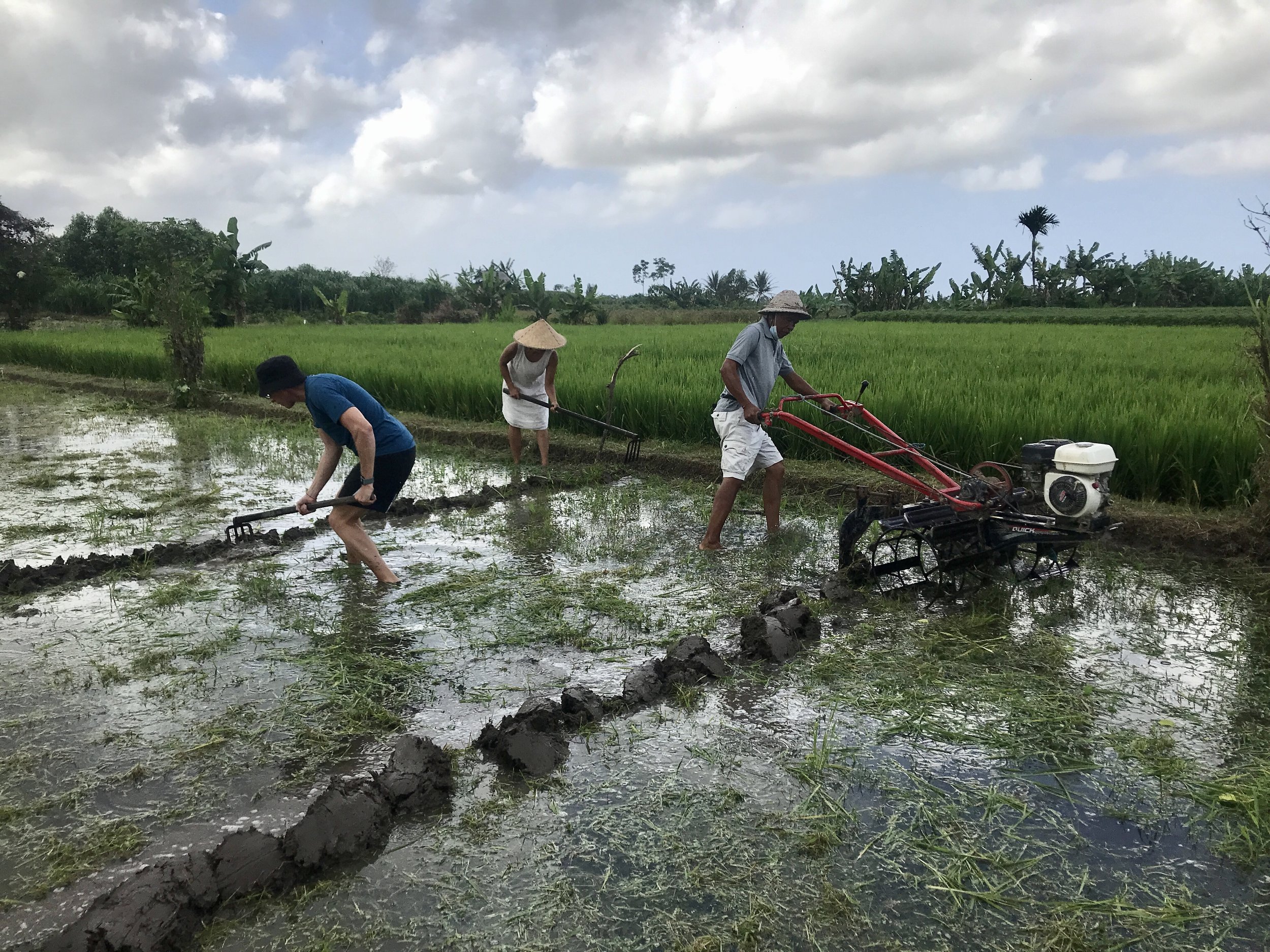6 unforgettable ways to see the ‘real’ Bali
Finding the “real” Bali while you’re on a quick trip isn’t always easy. This Aussie expat shares six top experiences to immerse yourself into the Balinese way of life.
1/6
Surf lesson
Surf lessons are a mainstay activity on Bali’s beaches, especially in the south, but some classes are more “Bali” than others. In the oceanfront village of Kedungu, on Bali’s southwest shores, the vibe is still chilled-out ’70s-style with tranquil waterfalls splashing off the cliffs, old Balinese ladies selling fresh coconuts and waves rolling onto an empty black volcanic sand beach. From a beach shack decorated with sepia-tinged surf photos, dinged boards and other nostalgia, Choky and his mates offer two-hour one-on-one surf lessons for about $25 ($10 cheaper than the rates in the popular surf-hub of Canggu). Hire boards and head out to beginner waves dumping on the east end of the beach or test your skills on the right-and left-handers directly in front of Choky’s shack.
2/6
Water purification ceremonies
Hindu blessing ceremonies are an integral part of the spiritual and cultural lifestyle of the Balinese people. They’re practised daily and range from simple flower and incense offerings to all-encompassing festivals that last for days and involve the whole community. One of the most immersive, literally, is the water purification ceremony known as Melukat, which means “letting go”. The ceremony is popular, especially around full moon, and is conducted at idyllic waterfalls, serene swimming spots and iconic temples across the island. At Taman Beji Griya, in Badung Regency, waterfalls pour through the tropical jungle into a waterway bordered by carved stone walls and hidden caves. In the green-filtered sunlight, visitors leave a trail of offerings and prayers for health and happiness. The fun part is next - immersing under the waterfalls to purify the body and mind. A guest desk at Taman Beji Griya can assist foreigners.
3/6
Cooking classes
The most inspiring cooking classes in Bali explore traditional recipes but also Balinese cooking techniques. When you find yourself grating fresh coconut with a grater homemade from the spikes of local snake fruit, or salak, you know you’re getting the real deal. At Subak Tabola Villa, in Sidemen, guests can take a cooking class in the blackened old Balinese kitchen, a big sturdy pavilion that is open to the elements so the heat of the hot plates and the coal-fired grill mingles with the humidity and cicadas. Forget blenders and pressure cookers, here it’s all about cooking with bamboo steamers, crushing garlic and lemongrass on old-style stone mortars to make sambal matah, grilling sates on open flames and chopping meat with knives that look, well, dangerous. It’s harder work, but the rewards lie in the kitchen camaraderie, sense of achievement and intensity of the flavours.
4/6
White-water rafting
The Ayung River is the longest in Bali, extending almost 90km from Kintamani in the north to Sanur down south. It feeds the rice farms along its course and with challenging grade II and III rapids, is ideal for white-water rafting. One of the best places to dip your paddle is near Ubud, where the river is flanked by a tangle of towering jungle, shrines and temples. You can sign up with a trained tour company at your accommodation. If you’re lucky enough to be staying at Four Seasons, Ubud, there’s an option of a white-water rafting check-in. Donning bathing suits and life jackets, guests send luggage ahead by car, and board the raft two hours up stream (about 10km). Highlights include steering the boat under waterfalls, slipping down a purpose-made slide to avoid a dam wall and jumping in the drink for a scenic float through a stretch of river with high canyon walls on either side.
5/6
Seafood market and beach dinner
On the neck of Bali’s southern peninsula, the fishing town of Jimbaran Bay is known for its beach sunsets and cheap local seafood. Jimbaran fish market, at the northern end of the bay, is one of the biggest in Indonesia. Old wooden fishing boats from across the Indonesian archipelago, along with colourfully painted Balinese reef boats, dock here each morning to offload crates of fish and crustaceans. Visitors can bargain for a whole fish then take their catch direct to the market’s roadside eateries. While you sit and wait, the fish will be cooked on smoking hot grills and served with fresh sambal and a simple salad. Another must-do is a sunset dinner at one of the seafood restaurants plonked right in the sand on Jimbaran Bay beach. Menega Cafe is a good option. Here, diners select fresh fish from tanks at the rear of the restaurant. They’re grilled over coconut husk fires and delivered to the table as the sun goes down.
6/6
Rice farm tour
In Indonesia a “gotong-royong” is a way to describe a shared communal task with a mutually beneficial outcome, kind of like a working bee. Gotong-royongs are a big part of Bali’s traditional rice growing culture where the spoils of a good harvest are shared between the families that helped grow the crop. Woven into this centuries-old social concept is the spiritual and cultural life of the community. To gotong-royong like a local, Astungkara Way’s half-day regenerative farm tour at Subak Uba Lambing in Badung Regency, is a chance to delve into different aspects of Balinese life while learning about rice farming. Participants might get knee-deep in mud to plant rice or use a sickle to help harvest grain. Other activities include a traditional blessing ceremony, a visit to the community garden and a yoga nidri mindfulness session.
- Penny Watson





